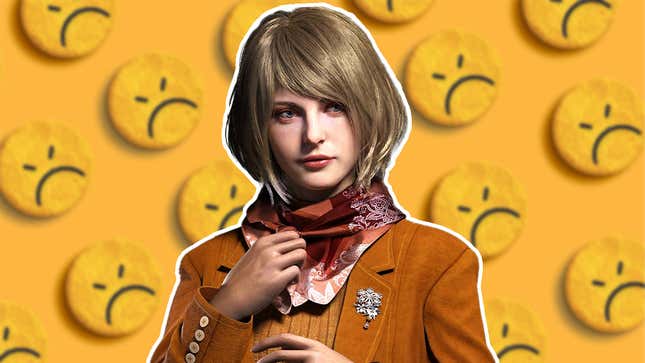
“Leon! Heeeelp!”
In 2005, Ashley Graham, preening president’s daughter and your game companion throughout most of Resident Evil 4, was best known for this booming, blubbering outcry, and second best known for the moving-car-flashes of white underwear some fans have dubiously obsessed over for nearly two decades. The supposedly more socially conscious 2023 Resident Evil 4 remake reduces the frequency of Ashley’s cry time and tosses her a skort for protection, but, outside of a few scattered scenes, doesn’t add anything to make her into more of a person. Without her ridiculously sexist former qualities—victim and sex object—Ashley is more ghost than woman.
The remake is otherwise masterful, so I was disappointed when I came to that conclusion. But it kept shouting at me while I played.
Ashley is preoccupied by Leon the entire time she trails him, only speaking to issue him a heads-up (“Leon! Watch out!), or stutter assent when he commands her to do something (“O-ok”). When he stops moving, she stops, too, to heave from all the jogging. She gets caught in bear traps (“Leon!”), gets lifted off by parasitic cult members (“Leon, help!”), and can’t stand to see Leon hurt (“Leon, no!”).
Even Ashley’s expectedly corny quips, which, for other characters, are stilted but real opportunities for personality, revolve around Leon (“Hey, Leon, there’s some armor. Bet you could use it like a bulletproof vest”). Whenever asked about herself, if she’s hurt, she demurs (“I’m OK, I guess”).
The longer I spend with her, the less I feel that I know who she is.
This problem might not have bothered 2005 RE4 players as much; they were satisfied to accept Ashley as the cardboard caricature she was intended to be, a shrill, incapable girl except for when she’s impishly berating the player for peeking up her skirt. (“Hey! What are you looking at?” she’d say in the original game. “Oh! You pervert!”)
An early fansite’s interview with 2005 Ashley’s voice actress Carolyn Lawrence gleefully mentions these upskirts, calling it “the fun question,” and asking if recording Ashley’s upskirt reaction seemed “odd to you?”
“They did show me a couple of scenes where Ashley starts running, and her skirt flips up, and you get a peek at her panties,” Lawrence responded. “I gave them a hard time about that!”
Apparently, to no avail. About Ashley, a 2012 blog titled “She’s Always A Woman To Me (Resident Evil 4)” complains, “She can’t use weapons, she can’t climb down ladders, she can’t avoid standing in bear traps,” but “Does she have any redeeming factors? Actually, in my honest opinion, she does.”
“She’s some sort of cute robot,” the blog continues. “She also gives you a cheer when you show off some of your 1337 sh00ting skillz, which gives you a well deserved boost to your ego.”
Great. That might have been enough for the early 2000’s gaming boy’s club, but modern gaming has been trying to move past one-dimensional female characters, bestowing them with more flesh and blood and not only pretty underwear.
Capcom, at least, seems to have made an effort to follow suit, removing upskirts, upskirt-related dialogue, and the always dissolving health bar that solidified Ashley as spineless, tearable tissue paper for players. And there’s more.
When players try to look up her skirt now, for example, Ashley bends to glare at wherever the game’s camera is, shaming them silently instead of indulging them with squealing displeasure. Her first cutscene in the remake, too, has her lunging at Leon—a stranger to her, at this point, in a strange, unsafe environment—with a weighty candelabra, showing more determination and physical strength than her introductory cutscene in 2005, where she halfheartedly chucks a hollow wood plank in Leon’s direction.
The small part of RE4 where Ashley is playable also seems designed to show Ashley as capable in the remake. There, Leon gets trapped and instructs her to run, but she resolves not to, instead choosing to shudder through the stone depths of Salazar Castle to find her way back to him. In the original, she runs when she’s told to, silently, but boldly smashing lanterns into enemies until she can return to Leon, who greets her with a hug.
The remake’s version of these events isn’t necessarily an improvement in characterization, because I think both attempts establish that Ashley, despite being a pampered president’s daughter, is handling her cruel circumstances as best as she can. But it builds off of her initial cutscene and her later daydreaming to Leon that “maybe someday, I’ll become an agent like you,” pulling together a more complete narrative.
More complete, perhaps, but still incomplete. These highlights are ephemeral in a large game where, for nearly the entire time, players see Ashley only speaking, reacting, and dreaming because of Leon.
That makes uncomfortable sense to me. Capcom intentionally laid upskirts and kittenish dialogue into Ashley’s foundation.
“So-called good girls acquire and maintain their good-girl status by acquiescing to the sexual intimidation of men,” Linda Lemoncheck writes in her 1997 feminist philosophy book Loose Women, Lecherous Men. In its remake, Capcom decides that Ashley is no longer just a good girl. But it never manages to fully understand what more she could be, choosing instead to continue to define her in terms of what men around her—including lewd players wanting to look under her clothes—do.
Video games have more to learn when writing compelling women characters, and really, it should have never taken so long in the first place. Women aren’t complex problems, they’re people. I think of a comment Belgian filmmaker Chantal Akerman once made about her 1974 movie Je Tu Il Elle—“I wrote a story that I liked. Everybody thought it was political. But it was a normal love story.”
I don’t need Ashley to be overtly feminist and adept at handling zombified cult members in order to appreciate her. I simply want to see video games write real women as well as they write real men. Normal, multifaceted women.